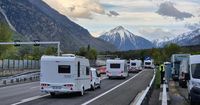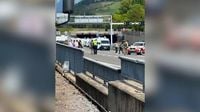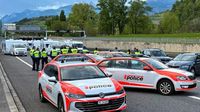On April 15, 2025, a significant police operation unfolded on the A9 highway in Saint-Maurice, Switzerland, as approximately 50 caravans of travelers were stopped from entering the Valais region without proper authorization. The situation escalated when the travelers, who had come from the canton of Neuchâtel, refused to heed police orders to exit the highway.
The incident began around 11:30 AM when the cantonal police, including units from both Vaud and Valais, were alerted to the presence of the caravans. According to reports, the travelers ignored instructions to divert to exits near Villeneuve, prompting the police to take decisive action. As a safety measure, the A9 was closed in both directions, leading to significant traffic disruptions.
"The A9 is completely blocked between Aigle and Saint-Maurice, with adjacent roads struggling to cope with the traffic," a local resident reported, highlighting the chaos caused by the blockade. The police had implemented detours via local roads to manage the situation, which lasted for over seven hours.
As the day progressed, the situation became increasingly tense. The police mobilized their Plan COBRA, a comprehensive strategy that involves the deployment of all available units, totaling around 200 officers. This marked one of the largest mobilizations in recent years, a fact noted by Stève Léger, a spokesperson for the Valais police, who stated, "We have not had to deploy such a large operation in several years."
The travelers had initially intended to settle on a private plot in Gampel, but their plans were thwarted when the local council opposed the arrangement, leading to the cancellation of their rental agreement. With the official area for travelers in Martigny already occupied, the police reiterated their stance against unauthorized encampments, emphasizing that "only the official site can be used by travelers; we do not tolerate wild installations."
As the police worked to manage the blockade, they communicated with the travelers, urging them to turn back. The caravan occupants, primarily French nationals, had suddenly departed from their previous location in Neuchâtel, where they had been stationed before attempting to reach Valais.
By the evening, after several hours of negotiations, the police reported that the travelers had left Saint-Maurice and the canton of Valais at approximately 7:15 PM. The authorities expressed their gratitude to the public for their understanding during the prolonged closure of the highway. "We are aware of the inconveniences caused and appreciate the patience of the community," the Valais police stated in a release.
Florence Frei, a representative from the Vaud police, confirmed that no accidents were reported during the incident, only traffic slowdowns. However, she noted that should the situation have persisted, civil protection support could have been requested to assist in managing the flow of traffic.
This incident is not isolated; just the previous week, a similar group of travelers attempted to settle in Estavayer-le-Lac, causing temporary disruptions. These ongoing challenges highlight the tensions between local authorities and traveling communities, often leading to confrontations over land use and settlement rights.
As travelers continue to seek temporary accommodations, the authorities are faced with the pressing need to balance public safety, community relations, and the rights of itinerant populations. The Valais police have made it clear that they will continue to enforce regulations regarding unauthorized encampments while seeking to minimize disruption to local residents.
In light of these events, the community remains vigilant and responsive to the evolving dynamics between travelers and local governance. The police's proactive measures aim to ensure that such incidents do not become a recurring issue, fostering a sense of order and safety on the highways and within the communities they serve.









